Articles Menu

The U.S. Army Corps of Engineers announced it will not allow the easement necessary for the Dakota Access Pipeline to be built near reservation lands. Newslook

(Photo: Brian Powers, Des Moines Register)
Sunday’s halting of the Dakota Access pipeline marks a key victory for Native Americans involved in the months-long protest, if not a decisive one.
The movement at Standing Rock represents the latest chapter in a centuries-old history of indigenous people striving to protect their land, and its magnitude goes beyond nearly any Native American protest before it.
That’s according to Tim Giago, a journalist and Oglala Sioux Tribe member who has covered Native American issues for decades.
“Over the last 50 years there have been protests taking place and I don’t think any of them have united like this one,” said Giago, who described the Army’s announcement Sunday that it would freeze the pipeline’s construction as “a major victory for the Indian nation.”
"The theme Water is Life has taken on a whole meaning not only for the Indian nations but for people in the United States and also all over the world," said Giago, who founded Native Sun News in Rapid City, S.D.

The Army’s decision denied an easement that would allow the pipeline to cross under Lake Oahe, a U.S. Army Corps of Engineers reservoir on the Missouri River in North Dakota. The pipeline would cross the river half a mile from the border of the reservation of the Standing Rock Sioux, whose members worried a pipeline breach could threaten their drinking water.
In a memo released Sunday, the Army’s assistant secretary for civil works expounded on the decision to deny an easement. Jo-Ellen Darcy specifically referenced policy from the White House Council on Environmental Quality that agencies “should heighten agency attention to alternatives” in some cases involving the environment and tribal resources.
"Although we have had continuing discussion and exchanges of new information with the Standing Rock Sioux and Dakota Access, it's clear that there's more work to do," Darcy said in a statement. "The best way to complete that work responsibly and expeditiously is to explore alternate routes for the pipeline crossing."
After Sunday’s celebrations died down, protesters vowed Monday to dig in their heels and remain in their camps on federal land, despite a government deadline that day to leave. With a pro-pipeline president taking office next month, the protesters expressed caution about what’s ahead in coming months.
Giago, the Native American journalist, described Sunday as “a temporary victory” for Standing Rock supporters who remain uncertain about the pipeline’s future once President-elect Donald Trump takes office.
As of Monday, though, he said, one thing did seem certain: “The people out there are going to stand, still.”
